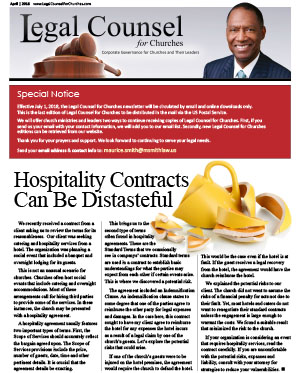We recently received a contract from a client asking us to review the terms for its reasonableness. Our client was seeking catering and hospitality services from a hotel. The organization was planning a social event that included a banquet and overnight lodging for its guests.
This is not an unusual scenario for churches. Churches often host social events that include catering and overnight accommodations. Most of these arrangements call for hiring third parties to provide some of the services. In these instances, the church may be presented with a hospitality agreement.
A hospitality agreement usually features two important types of terms. First, the Scope of Services should accurately reflect the bargain agreed upon. The Scope of Services provisions include the price, number of guests, date, time and other pertinent details. It is crucial that the agreement details be exacting.
This brings us to the second type of terms often found in hospitality agreements. These are the Standard Terms that we occasionally see in companys’ contracts. Standard terms are used in a contract to establish basic understandings for what the parties may expect from each other if certain events arise. This is where we discovered a potential risk.
The agreement included an Indemnification Clause. An indemnification clause states to some degree that one of the parties agree to reimburse the other party for legal expenses and damages. In the case here, this contract sought to have my client agree to reimburse the hotel for any expenses the hotel incurs as a result of a legal claim by one of the church’s guests. Let’s explore the potential risks that could arise.
If one of the church’s guests were to be injured on the hotel premises, the agreement would require the church to defend the hotel.
This would be the case even if the hotel is at fault. If the guest receives a legal recovery from the hotel, the agreement would have the church reimburse the hotel.
We explained the potential risks to our client. The church did not want to assume the risks of a financial penalty for acts not due to their fault. Yet, most hotels and caters do not want to renegotiate their standard contracts unless the engagement is large enough to warrant the costs. We found a suitable result that minimized the risk to the church.
If your organization is considering an event that requires hospitality services, read the contract carefully. If you are uncomfortable with the potential risks, expenses and liability, consult with your attorney for strategies to reduce your vulnerabilities.

